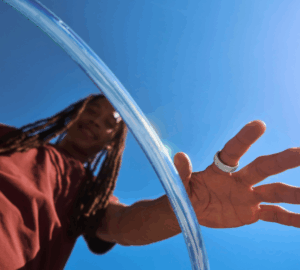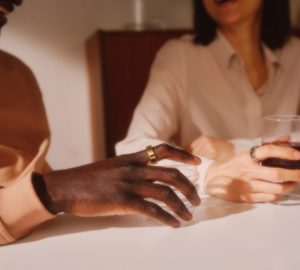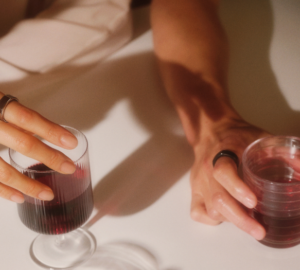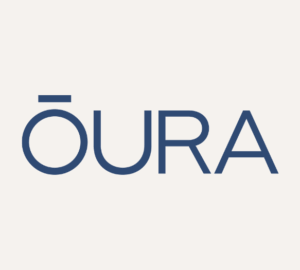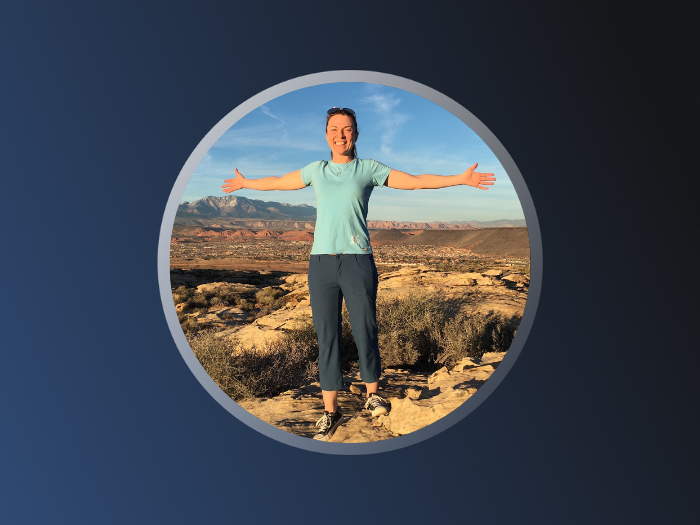Who: Hannah P., 44, Ontario, Canada
Oura member for: 1.5 years
Surprising insight: After crashing her mountain bike into a tree, Hannah thought she was fine — a scraped arm and sore neck, sure, but fine. (For mountain bikers, bruises are badges of honor.) But when she woke up the next morning, she was shocked to see her Readiness Score had plummeted, with an elevated resting heart rate and lowered heart rate variability. Unbeknownst to her, her body needed time to heal — even if she wanted to push through the pain.
Tell us about yourself.
I am Director of International Strategy and Operations here at Oura. I’m responsible for how we think about and operate in countries outside of the United States — and I love my job.
What made you decide to purchase an Oura Ring?
During the pandemic, I was a people leader, with a capital L, at my previous job — and the people on our team became the most important thing. I realized in order to show up for those people, I needed to show up for myself — for my mental health.
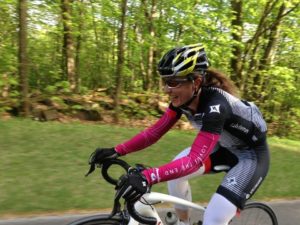
But I needed help doing that. I needed external data to keep myself accountable. I’ve been riding and racing bikes for 20 years. I know that when you look at your metrics, it changes the way you see yourself, what you’re doing, the impact of the choices you make. I needed something to help me understand those impacts.
The Oura Ring was big in the cycling world in 2020. I bought it for myself as a late Christmas present in January 2021. I put it on my finger and changed my life. It has helped me make better choices and hold myself accountable. Sometimes I don’t make the right choices, but at least I’m making an educated choice.
What are the top health insights you’ve discovered since becoming an Oura member?
I drink less. It’s amazing how one glass of wine can really wreck your sleep. I also really focused on my bedtime. I’ve told my partner — he’s a night owl, and I’m not — that I really need to focus on going to bed earlier. I also don’t eat as late.
Now, when I wake up in the morning, I know what metrics to look for. If my Readiness Score is a bit low, no matter how I feel, I know that I need to take more time to prepare for that big meeting, or to make sure I’m more present for my step-kids. Oura helps me take care of myself and prepare for whatever I have that day. It’s hacking my body to hack my mind.
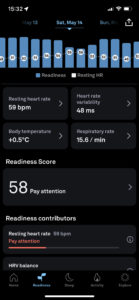
You shared with some colleagues that you had a mountain bike crash, and your Oura App showed you some interesting insights the next day. Tell us about that.
I went out for a ride early one morning on my local trails. They were super dry and dusty. I had my music in and was just going a little bit too fast with old tires (I even ranked 5th on a section on Strava just before my crash!). Then my front wheel washed out, sending me head-first into a tree — well, with my arm in front of my head. It hurt a little bit, it stung, but then I got up and rode home, slowly.
Then I got up the next morning. And lo and behold, my Readiness Score is in the 50s. This was an a-ha moment for me. I’m so used to falling off my bike — for mountain bikers, bruises are badges of honor. I had no idea what it actually did to my body — my HR was elevated, HRV depressed. Saturday my Readiness Score was 58; Sunday was 54; and by Monday I had recovered to 70. I seriously thought I had Covid, but I tested 6 times over those three days, all negative and no signs of sickness.
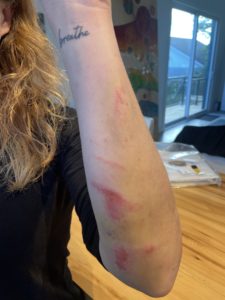
The numbers don’t lie. Unbeknownst to me, my body was healing. It was this phenomenal insight into how much work your body does, without you even knowing it, and how much that affects you. We need to think about how we need to give ourselves time to recover. We think about time to heal emotionally when bad things happen, or time to heal physically when we break a leg, but we don’t think about the little things — the skinned knees or the road rash. Sure, we can get up and keep going, but sometimes our bodies need a little bit more time to heal.
What’s your #1 tip for other Oura Members?
Again, the numbers don’t lie. And your numbers are not the same as everyone else’s — your numbers are yours and yours personally. But once you figure out what they mean, they don’t lie to you.
My favorite feature is Oura on the Web. The correlation charts really helped me figure out those key metrics that are correlated to my Readiness Score, and what those metrics need to be. So for my resting heart rate, I need to get it down below 50 at night, and for HRV, I need to get that up over 80. Those are my metrics. If I get 7 hours and 50 minutes or more of sleep, with a heart rate below 50, and heart rate variability above 80, you can’t stop me the next day. Those are the goals.
What’s Your Oura Story?
Everyone’s story is unique, and we’d love to hear yours. Share your story here.







